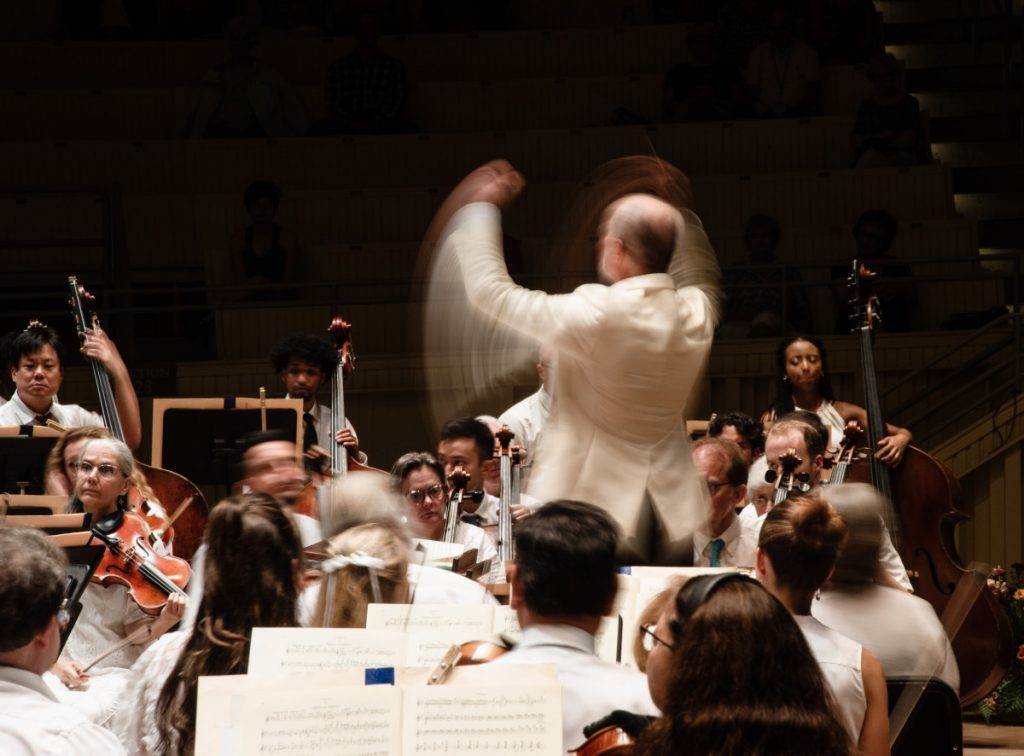
Gabriel Weber
Staff Writer
Equally at home with jazz and classical music, pianist Aaron Diehl fits the bill for George Gershwin’s blending of musical genres in Piano Concerto in F.
At 8:15 p.m. Saturday in the Amphitheater, the Chautauqua Symphony Orchestra performs under Music Director and Principal Symphonic Conductor Rossen Milanov’s baton, with Diehl as soloist. Diehl will perform Gershwin’s Piano Concerto in F; Carlos Simon’s “Four Black American Dances” precedes it and Antoin Dvořák’s “The Water Goblin,” Op. 107 opens the concert.
Gershwin composed much of his Concerto in F in the summer of 1925, on the grounds of Chautauqua in a practice cabin that still stands to this day, and this weekend’s performance celebrates 100 years since the concerto’s premiere. An absolute piece, it is meant to be appreciated as an instrumental work of art, unrelated to a specific narrative.
“It’s an influential piece because, just like his Rhapsody in Blue, it’s kind of a crossover between jazz and purely classical piano tradition,” Milanov said. “He has created one of the very vital American-made sounds that are so unique and always recognizable.”
Milanov and Diehl have played this piece together before in Columbus, where Milanov is music director of the Columbus Symphony Orchestra and where Diehl was born; “he really plays this piece very well,” Milanov said. Diehl is also a part of a jazz trio with bassist David Wong and drummer Aaron Kimmel.
While CSO Double Bassist Caitlyn Kamminga has played Concerto in F many, many times and finds it to be a great work, she also acknowledges the technical challenges.
“Getting that tight, rhythmic, syncopated feeling is definitely a harder thing to do with 80 to 90 musicians on the stage,” Kamminga said. “But this is such a hot orchestra that it’s just not an issue.”
Opening the evening, Dvořák’s “The Water Goblin” is a Romantic tone poem whose narrative is a deeply unromantic fairy tale. A young girl is lured out to a lake and abducted by a goblin who forces her to marry him; after she gives birth, he releases her on the condition that she not embrace anyone. When the girl’s mother forbids her to go, the goblin places the headless baby at their doorstep.
“I don’t believe these are fairy tales for children,” Milanov said. “Each one of these characters and this sequence of events are portrayed in an incredibly inventive way. The music is not really that violent, in a Wagnerian way — it’s violent in a way that you’re going to tell a fairy tale story.”
Many of those rhythms and themes are taken from an incredible musical heritage, Milanov said, and “Four Black American Dances” takes a similar approach. There are four movements titled “Ring Shout,” “Waltz,” “Tap!” and “Holy Dance,” each of which provides a wide range of cultural and social differences in Black American communities.
“In a way, (composer Simon) reflects the dance folklore of the Black American people,” Milanov said. “He always infuses specific meaning; ‘Waltz’ is like a Viennese genre, but here he just uses it and reimagines it as an expression of dignity. Then ‘Tap Dance’ employs percussive freedom of tap dancing with, in this case, jazz-influenced feminism. ‘Holiday Dance’ is kind of like the climax of the worship practices with praise breaks.”
Composed in 2023, Simon’s recent piece fits perfectly within the CSO’s repertoire — Milanov likes to say to Kamminga that he wants to get the cocktail right between boring people to death and challenging people to death. The goal of bringing in fresher and innovative works goes back to Gershwin’s Concerto in F — a work born at Chautauqua, and now part of the canon.
“I was thinking about how important it is to have an institution like Chautauqua that is interested in incubating new works, and here (Gershwin’s concerto) is 100 years later, being played on the stage,” Kamminga said. “What an amazing thing that is.”
Kamminga grew up sitting backstage at the Minnesota Symphony Orchestra, as her dad and stepmom were a French horn player and cellist, respectively. Her dad used to say that she came out of the womb with a natural embouchure, meaning the mouth position required for instruments.
She started with the French horn. She didn’t practice very much but got away with it, flying by the seat of her pants until she hit a wall when learning from her dad. Even though he was the best teacher in town, Kamminga, in her righteous adolescence, believed she knew more than him.
“One day he just took the horn out of my hands,” Kamminga said. “He said, ‘That’s it. You’re done. If there’s another instrument you want to play, that’s fine.’ And I said, ‘Well, I kind of like the sound of the bass.’ I used to sit backstage behind the bass section, and it was so awesome to hear that low end of the orchestra.”
A week later he bought her a bass, and another week later set up lessons. The instrument is a much better fit for her personality, she said, and she particularly enjoys setting the other members of the orchestra up for success by maintaining the rhythm section.
“I like being a part of the foundation and a team of players. The bass section is smaller than the other string sections, so we have relationships with each other in ways that maybe the violin section doesn’t because they’re so large,” Kamminga said. “Little moments where you shine, and every once in a while we’ll get a solo — that’s really fun.”
Coming to Chautauqua every summer, Kamminga aims to engage with other disciplines outside of music. Most recently, she hosted a session on utilizing art as a means of raising awareness of and combating climate change.
With the end of the summer approaching and proposed budget cuts looming on the horizon, many are nervous — yet Kamminga finds hope that, in surveys, Chautauquans point to the orchestra as one of their top reasons for visiting. She referenced the Norton Hall inscription, “All passes, art alone endures.”
“To me, (Gershwin’s Piano Concerto in F) was composed that long ago and here it is being played again and revered and looked at through a different lens — that is just a really amazing thing,” Kamminga said. “I think it is rare to have a community of people that believe in that. We have the CSO League that puts on several receptions for the musicians each summer, and we feel really cared for — people genuinely want to know about our lives.”




